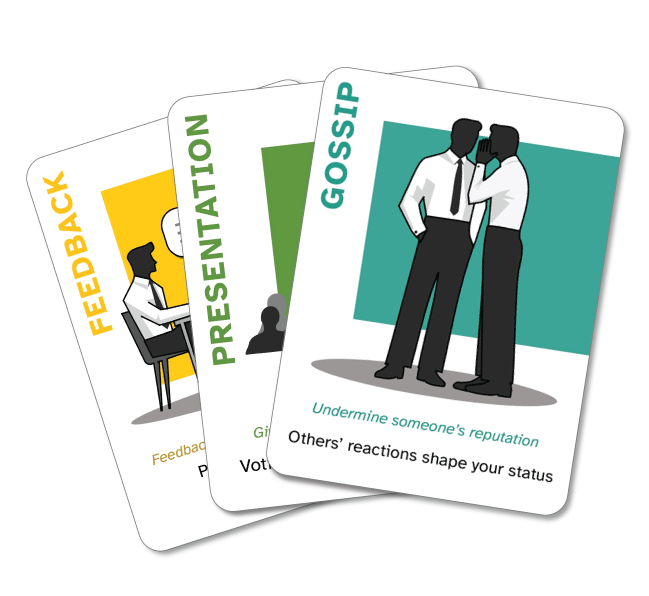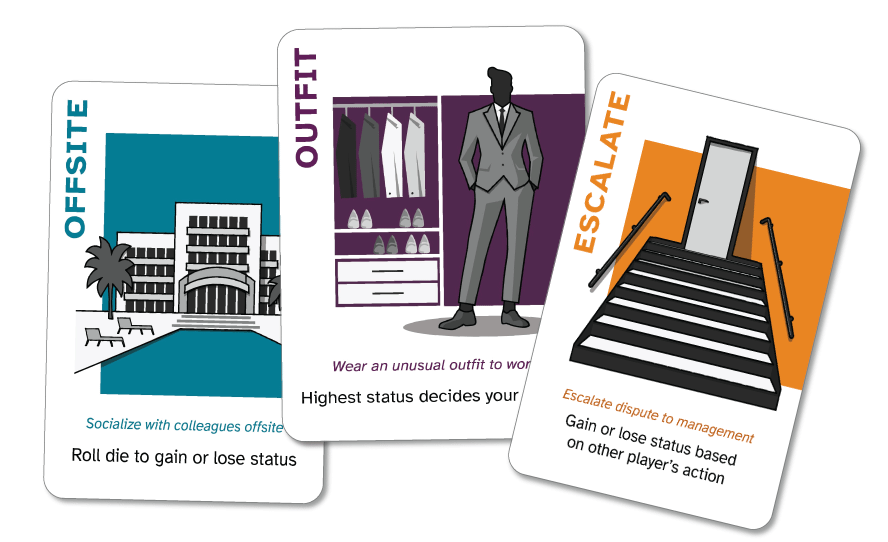How to play promotion!
GAME RULES
To win the game, be the first to collect 5 Status cards and 5 Power cards.
You can hold a maximum of 8 Action cards at any given time, which you can trade or gift in your turn.
Show your Action, Power, and Status cards, or hide them, the choice is yours!
Office chatter is a normal part of life. Anyone can say anything at any time about the cards they have or don’t have, make promises or threats to play certain actions in the future, create coalitions, make deals to trade action cards, and more.
For the complete rules of the game, click here.
SETTING UP THE GAME
Give each player 4 Action cards (one Collaborate, and 3 others randomly from the deck), 2 Status, 2 Power, and 2 Voting cards (one Vote Up and one Vote Down).
Create three decks for the group – for Status, Power, and Action cards.
Decide where the discard deck will be.
Shuffle the deck of Action cards before you start playing.
Playing THE GAME
Choose a player to go first. Going clockwise, each player, in turn, takes an Action card from the central deck. They can then choose to play one (and only one) of their Action cards by placing them in the discarded cards pile or finish their turn without playing any of their Action cards.
Some Action cards allow you to react to another player’s action during their turn. For example, you can use your Collaborate or Challenge cards to support or block another player’s action. To do that, place your card in the discarded cards pile right after they have placed their Action card. Reacting within someone else’s turn does not count against your turn. If you react to someone else’s action within their turn, take a new action card(s) from the central deck to replace the used ones.
If you have no Power or Status cards and an action results in losing power or status, you become excluded and sit out for one round. You do not get to play your turn, and you cannot react to others’ actions during that round.
When multiple players use their Voting cards to determine the outcome of a play, count out loud “1,2,3” and have everyone reveal their “Vote Up” or “Vote Down” cards simultaneously.
You cannot vote on the outcomes of your own actions.
Use the central deck of resources whenever you lose or gain power or status.
Action Cards
(in alphabetical order)
For the complete description of the action cards and their consequences, click here.
ASK
Everyone asks for help sometimes. Ask another player to give you an Action card of their choice. They must comply but may choose which card to give you.
ASSIGN
Assign an undesirable task to another player. This makes them lose a Power card.
BLAME
Blame a recent failure on another player. You gain a Power card; the blamed player loses a Power card.
BROKER
Connect other people to gain status. Everyone (except you) votes.
0 “up” votes: You lose 1 Status card
1 “up” vote: You neither gain nor lose
2 “up” votes: You gain 1 Status card
3 or more “up” votes: You gain 2 Status cards
BURDEN
Your boss assigns you a dull and unimportant task. Pick another person to work on it with you. You and another player of your choice each lose a Power card.
CHALLENGE
Sometimes, enough is enough! Block any action by another player, including those not involving you. A maximum of two Challenge cards can be used sequentially in a given turn. Challenging a Challenge reinstates the original action.
CLAIM
Claim credit for a successful work project and gain a Power card.
COLLABORATE
There is strength in numbers! Initiate collaboration and gain a Power card if another player joins you.
A player can join you by using their Collaborate card or discarding any two Action cards
The joining player does not gain power; they replace their Action card(s) by drawing from the central deck
If multiple players wish to join, choose with whom to collaborate
COMPETE
Think you can handle a task better than someone else? Compete with them head-to-head! You and another player of your choice each roll a die. The higher number wins a Power card, and the lower number loses a Power card. If you roll a tie, roll again.
ESCALATE
Escalate a disagreement with someone to management. Choose another player - you gain a Status card, and they lose a Status card.
If the player you chose reacts by placing their Escalate card, each of you loses one Status card — management doesn’t know whom to support and doesn’t appreciate their time being wasted!
FEEDBACK
Your unpredictable boss invites you to a fireside chat to give you feedback. The player(s) with the most Power cards (other than you) decide(s) what happens next:
More “down” votes: You lose 1 Power card
More “up” votes: You gain 1 Power card
Tie: You neither gain nor lose power
GOSSIP
It takes 3 to gossip! Choose one player to gossip with (your partner) and one player to gossip about (your target).
If your partner decides not to join, you lose a Status card.
If your partner joins you (by using their Collaborate card or any two Action cards), you gain a Status card and the target of gossip loses a Status card. Your partner does not gain or lose status, but they get to draw from the central deck to replace their Action card(s).
HUMOR
You choose to tell a risky joke at work. All the players (except you) vote to decide what happens next. Your outcome is as follows:
0 “up” votes: You lose 2 Status cards
1 “up” vote: You lose 1 Status card
2 “up” votes: You gain 1 Status card
3 or more “up” votes: You gain 2 Status cards
NETWORK
Attend a networking event. It might be awkward, or you could make new connections. Roll a die to discover if it paid off.
1 or 2: You lose 1 Status card
3 or 4: You neither gain nor lose
5 or 6: You gain 1 Status card
OFFSITE
The firm is hosting a fun event away from headquarters. Roll the die to see if you are invited.
1,2,3: You weren’t invited - lose a Status card
4,5,6: You were invited - gain a Status card
OPPORTUNITY
The CEO invites you to shadow them on an important work trip and asks who else you think deserves to go. Playing this card earns you and a player of your choice a Power card.
OUTFIT
You wear an unexpected new outfit to work. Will your coworker(s) love it or hate it? The player(s) with the most Status cards (other than you) decide(s):
More “down” votes: You lose 1 Status card
More “up” votes: You gain 1 Status card
Tie: You neither gain nor lose status
OUTSIDE OFFER
Another organization is trying to recruit you. You leverage the outside offer to gain one Power card but lose one Status card - disloyalty is frowned upon!
PRESENTATION
You give a very important presentation at work. Everyone (except you) votes to determine how successful it is.
0 “up” votes: You lose 2 power cards
1 “up” vote: You lose 1 power card
2 “up” votes: You gain 1 power card
3 or more “up” votes: You gain 2 power cards
VOLUNTEER
You volunteer to organize a social event for the firm. This takes a lot of time, but some folks are grateful. You lose one Power card, but gain one Status card.
FAQs
-
The rules of the game and the number of cards in the deck are set to work best for groups of 4 to 6 players. For example, some action cards require voting up or down. Playing with fewer than four or more than six participants may disrupt tasks like these and affect the overall experience.
-
No. The deck consists of 12 Collaborate cards, 6 Challenge cards, and 4 cards each of the remaining 18 types of action cards.
-
You get to choose whether to show your cards to others. You can play with open cards so that everyone can see everything or hold them in your hand and surprise others with your actions.
-
No, you can only trade action cards. However, because action cards directly influence power and status, trading or gifting them will influence players’ power and status.
-
Yes, you may discard any two action cards instead of a Collaborate card. You can use this option to collaborate with others if you have a Collaborate card and wish to keep it.
-
Anyone can say anything they want at any point in the game, including making promises about their future behavior and soliciting promises from others.
-
All players with the highest number of status cards vote on Outfit / Feedback.
-
No. You do not have to tell other players how many power and status cards you have. However, if you are unwilling to share how many power and status cards you have, you will not be able to vote on others’ actions when they play Outfit or Feedback.
-
Yes. This can happen if another player uses their Ask action card and forces you to give them a card, or if you trade multiple cards for a single card with another player. You will draw a new card in your next turn, or you can make more trades in your turn to get more cards.
-
Take all the cards everyone placed in the discard pile during their turns, reshuffle them, and continue playing.
-
This is a rare scenario. In that case, you can temporarily play action cards that result in transferring power or status between players (e.g., blame, gossip) rather than action cards that involve taking resources from the deck (e.g., claim, network) until power and status cards become available again in the main decks.
-
You can use the Burden action card in several ways. A few examples are: (a) when you have many power cards and worry that another player may win the game before you if they gain additional power; (b) as one of the two cards you discard instead of a Collaborate card; (c) as the card you give another player when they play the Ask card and make you give them one of your action cards; (d) showing it to discourage another player from voting against you.
-
You decide! Different groups develop different norms. In some groups, the player places the card in the discard pile and that’s it. In other groups, everyone jointly decides that the player who uses action cards like Humor, Presentation, or Outfit is required to tell a joke, say what the presentation will be about, or describe what they will wear to work.
-
Yes, there is one action card that, if played in the last and winning turn of a player, can cause two players win together simultaneously. See if you can figure out which action card will allow you to produce a win-win outcome!
Other Resources
-
Teaching materials for instructors and educators will be available from the Dispute Resolution Research Center (coming soon!)
-
Email Prof. Halevy at nhalevy@stanford.edu to book a game session and/or a workshop for your employees.
-
Download here.


